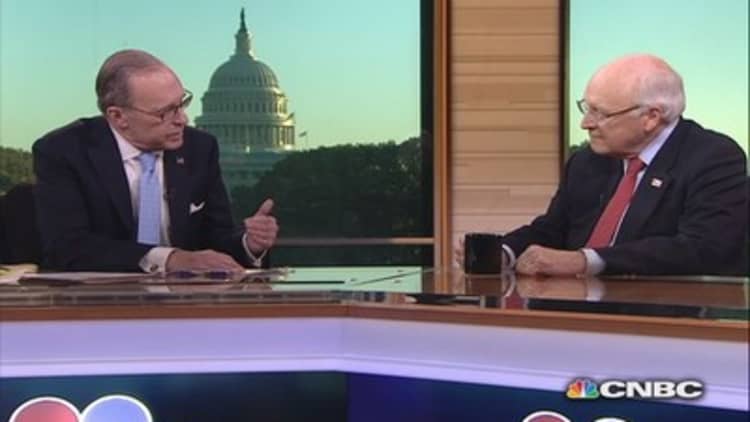
When former Vice President Dick Cheney is on "The Kudlow Report," he's usually talking politics. When he sat down with Larry Kudlow this week, he did talk politics but he also spoke about something more personal — his heart transplant and how sick he really was.
(Read more: Cheney: I have 'grave doubts' about Obamacare)
Cheney has struggled with heart disease for nearly 35 years, through his time as a senior member of Congress (1979-1989), Secretary of Defense (1989-1993) and Vice President of the United States (2001-2009). He had his first of three heart attacks when he was just 37-years-old, striking while he was in the middle of his first congressional campaign.
"It was a mild heart attack, but it was obviously a stunner," Cheney said.
Two and a half years ago, he became very ill and needed to have a heart transplant. The first step was an operation to insert Thoratec's HeartMate II Left Ventricular Assist System.
"I was near death when they put the batteries in," Cheney said. "I was a very sick fellow when they put the pump in. I had 35 weeks of rehab. I was in the hospital for five weeks — a lot of them on a respirator. I had pneumonia. So getting out of that —recovering from that — was a tough task. And that was the toughest thing I'd had to go through."
That heart pump bought him 20 more months until he had a successful heart transplant in March 2012.
The former vice president credits medical innovations and entrepreneurs who took financial risks to develop technologies that allowed him to stay one step ahead of his disease.
"The way my doctor described it, he said: 'It's like you get up in the morning to go to work and you hop in your car and you're late and every stoplight ahead of you is red. But ... Cheney, when you get to 'em, they all turn green.'"
Cheney documents his experience in his new book, "Heart: An American Medical Odyssey."
Cheney last appeared on "The Kudlow Report" in August of 2011. His return to the show coincides with the American Heart Association & the American College of Cardiology's dramatic shift in the way doctors assess and treat cardiovascular disease. The new clinical guidelines adjust the way by which the medical community calculates a person's heart-attack risk, and when to treat with cholesterol-lowering statin drugs. For Cheney, statins proved to be one of the most important medical advancements in the treatment of his heart disease.
(Read more: New guidelines back stronger therapies for heart patients)
"The summer of 1998, I had my third heart attack, underwent quadruple coronary bypass surgery, and that was about the same time they started me on cholesterol-lowering drugs, which had just been on the market a few months," said Cheney. "That had a bigger impact, I think, because, the previous ten years, I'd had three heart attacks, six hospitalizations, etc. In the 12 years after that, I didn't have a single incident affecting my heart."
For Cheney, high cholesterol levels were the biggest problem for his heart condition. "If it hadn't been for the statins, I'd have been dead a long time ago," he said. The statins, he said, helped cut his cholesterol in half in just a matter of months.
Cheney said he believes his experience should prove to others that surviving chronic heart disease is possible and by encouraging continued investment and innovation, treatments will continue to improve.
"We've gotten so good now at dealing with heart disease and innovated so many different ways to manage it ... and to survive it, that we wanted to write that in the book," Cheney said. "The story that I hope people will take away from the book is one of hope."
— By Krista Braun and Ben Thompson

